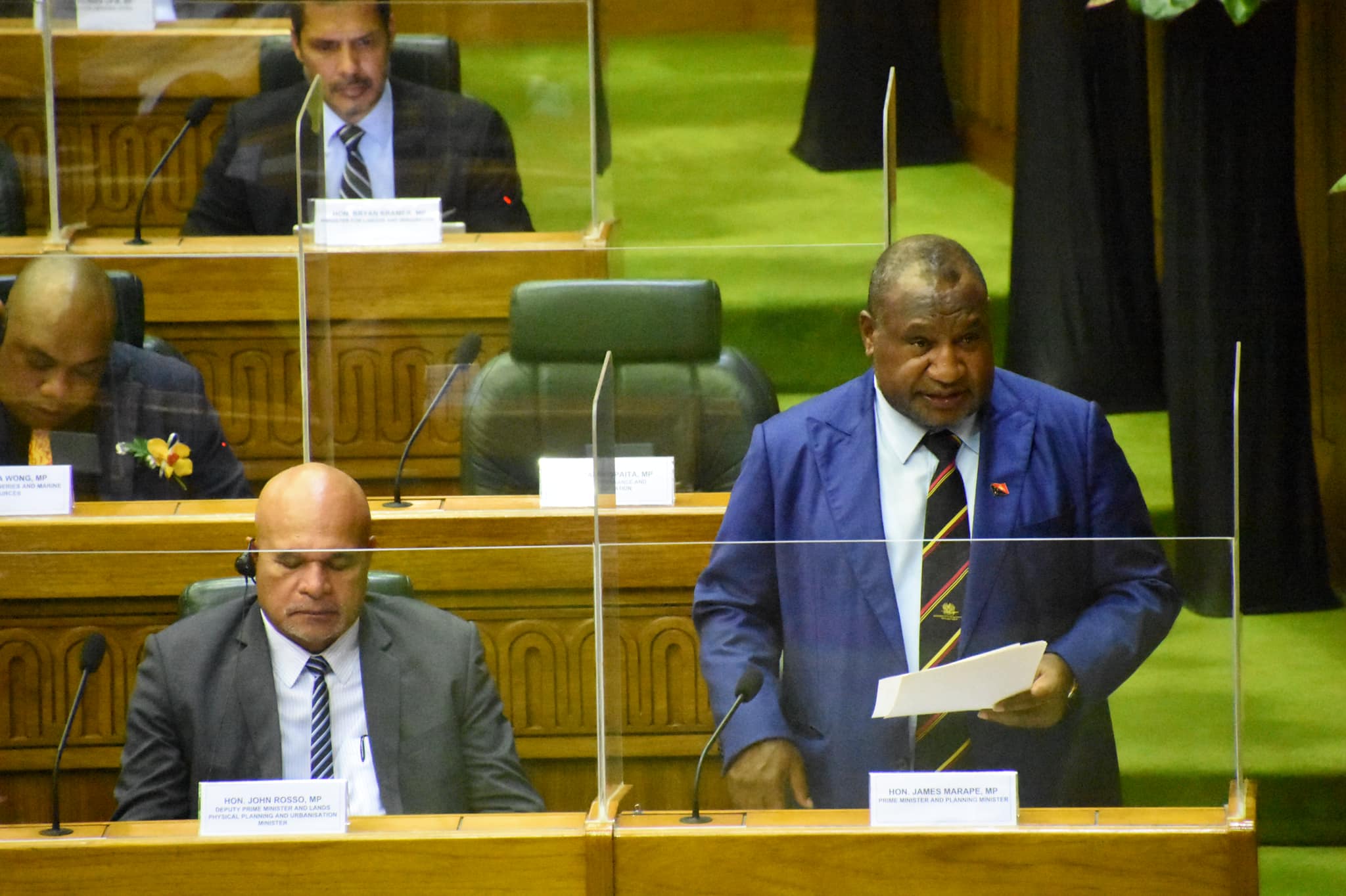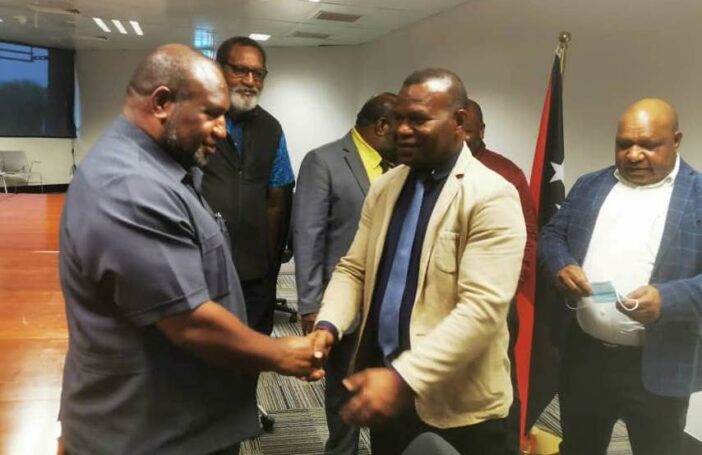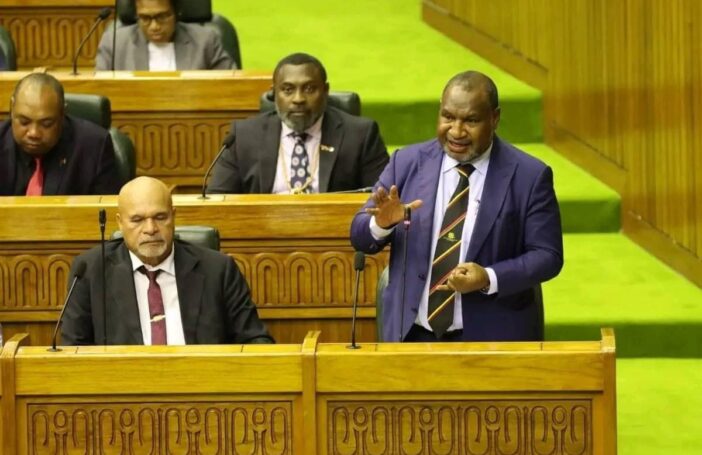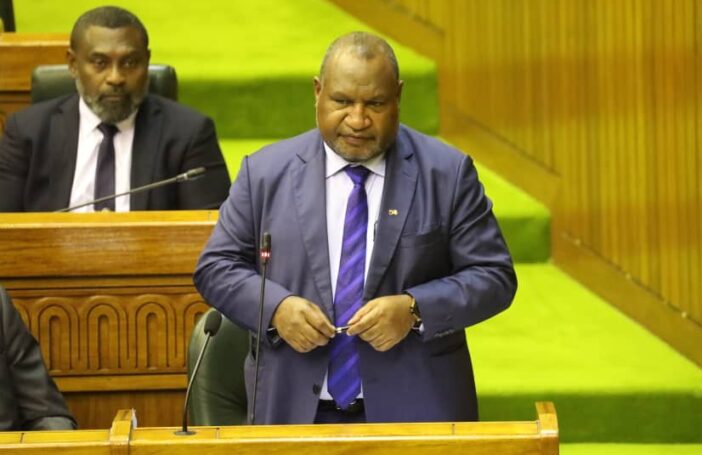Two factors favoured James Marape going into the 2022 national elections and helped ensure his return. First, section 63 of the Organic Law on the Integrity of Political Parties and Candidates (OLIPPAC) passed in 2001 (and subsequently amended in 2003) mandates that the party with the highest number of MPs elected following a national election be invited to form the government. This is why there was only one nominee – James Marape – when parliament met to elect the PM for the 11th parliament. Marape’s Papua and Niugini Union Pati (PANGU) had 36 MPs to Peter O’Neill’s People’s National Congress party (PNC)’s 14 when parliament met.
The second has to do with the political culture of PNG’s parliamentary politics. Over the life of the parliament, MPs tend to join the party of the PM. The PM’s party then goes into the elections with by far the largest number of MPs, and subsequently emerges with a higher number of MPs. PANGU’s success in 2022 is a result of this pattern, with 25 out of 32 or 78% of incumbent MPs getting elected. In late April 2019, PANGU was left with only one MP, the former Governor of Morobe Province Ginson Saonu. PANGU numbers increased after Marape was elected PM and joined the party. PNC’s numbers fell from a maximum of 48 to a low of 13 in the same period after O’Neill was forced to resign as PM. Six got re-elected in 2022.
The question now is whether Marape can stay in power once the 18-month grace period expires – within the first 18 months following the appointment of a PM, a vote of no confidence is not permitted. In a vote of no confidence, any MP – one from a small party, or an independent for that matter – can contest for the PM’s seat. Unlike immediately after the elections, there is no special treatment for or protection of the largest party.
Only two PMs have ever completed their five-year terms. The rest were either replaced in a vote of no confidence, or resigned to avoid one, whilst the Supreme Court ruled Paias Wingti’s re-appointment as PM in 1993 unconstitutional.
Michael Somare was the first. His completion of the 2002–2007 term is often attributed to provisions of OLIPPAC which prevented MPs from switching parties. These provisions were declared unconstitutional in 2010.
Peter O’Neill was the second PM to complete a full term. He completed the 2012–2017 term partly as a result of a slew of constitutional amendments. These included extension of the grace period from 18 to 30 months, an increase in the number of MPs required to sign the motion for a vote of no confidence from 11 to 22, and an increase in the prior notification to parliament of a vote of no confidence from one week to 30 days. Because the opposition was depleted at the time, opposition MPs did not have the minimum number of MPs required to institute a vote of no confidence when the extended grace period ended. These constitutional amendments were all declared unconstitutional in 2015, but helped O’Neill prior to that.
Marape does not have the protection of OLIPPAC that Somare had, or the protection of constitutional amendments that O’Neill had. And he knows well how things can change once the 18 months grace period is over. In 2020 when the grace period following his 2019 election expired, as many as 20 MPs, led by the deputy PM and some other senior ministers, left his coalition to join the opposition. It was only through clever manoeuvring, including an unconstitutional sitting of parliament, and the use of adjournments, that Marape was able to survive as PM.
The limited window for a vote of no confidence also helped him, as a vote of no confidence is not possible 12 months before the next election. The opposition basically ran out of time trying to remove Marape as PM as the 2022 elections approached. In no term has PNG ever had more than two PMs, so the one who is second is normally secure. This time round, Marape is the first PM of the 11th parliament. To stay in power, he will have to defend votes of no confidence from early 2024 to mid-2026.
Votes of no confidence are power games, but need a narrative to succeed. Investigation into cases of alleged fraud, such as Marape’s son being linked to money laundering charges, are a risk for Marape. Inflation, delays in resource projects, and election-related violence are other issues that the opposition will likely use as grounds to mount a motion for a vote of no confidence.
Three things are in Marape’s favour. First, several political figures who led the charge to replace him in the last parliament and might be expected to in this one are not in parliament. Patrick Pruaitch lost his election, and Sam Basil passed away. Peter O’Neill has decided not to take the opposition leader’s position, suggesting that he will back an alternative to Marape rather than run himself. But, at least for now, there is no clear alternative.
Second, the Speaker of Parliament is from PANGU, and the Parliamentary Business Committee (PBC) will likely be filled with MPs from PANGU or others loyal to Marape. The PBC vets and approves motions for a vote of no confidence, and is chaired by the Speaker of Parliament. These two institutions have worked in the past to frustrate votes of no confidence.
Third, PANGU has had a convincing election result, and Marape has strategically appointed key MPs in the party to important ministerial portfolios, and retained 62% (21) of the ministries within PANGU. If Marape can keep PANGU together, he can survive the loss of a coalition partner.
Keeping his own party united behind him will be Marape’s key challenge as he seeks to become PNG’s third prime minister to survive a full term of parliament.





Hi everyone,
I’m new here, however that’s not the case, we know many news popping up through Marape leading Government. If this an influential factor, we as a citizen of PNG needs to pray for the goodness of our country. Anyways, I think we should just hang on the fence – meaning not taking sides and thankyou for the above ideas contributed. Thanks very much. Let’s look carefully to what’s happening next.
PM JM is an experienced politician as well as a senior Minister to several key portfolios during his stint as a MP. Morover he is a native bred and advocated leader with local instincts which are attributes implanted by God. The true nature’s of JM’s leadership depicts his moral ethics and stable decisions with pure malenesian caliber supportive of fellow citizens and members of the vast tribes of multi cultures…so that clearly indicates JM to survive the coming vonc.
James Marape was appointed by God to do important role.
Only Adventist had implement and killing Jesus Christ because the Adventist are keeping law of God so they have right to play last role.
we have huge program PNG for Christ, PM JM will actively involved so God will favor to him.
Our life, story and destiny is God’s hands. we can have many critics about James Marape whether it be positive or negative, God knows who James Marape is and the other leaders of parliament.. God himself will have the final say whether to retain James Marape as the prime minister or elect another member of parliament. God searches the mind and heart of man to reward him, Jeremiah 17:10
The feeling of insecurity has resulted in using the name of our creator and pledges of huge development fund to our MPs and Governors, which have the potential to lure them to stick with JM. However, inflation, unemployment, high Debt ratio, Law and Order issues are affecting us to a degree where it needs immediate remedy.
Thanks
Mike, correction on 63 of OLIPPAC; Invitation to form govt is under s. 76 of OLIPPAC, not s. 63. Just a correction. Thanks.
Thanks Xavier.
Clarification: There are two versions of OLIPPAC online. OLIPPAC 2001 and OLLIPAC 2003.
The first OLIPPAC was passed in 2001 under Mekere Mourata. It was amended and new provisions (restrictions to movement of MPs) were added in 2003 under the Somare Government. OLIPPAC 2003 is therefore replaced OLIPPAC 2001.
Whilst provisions on government formation come under section 76 in the earlier version, under the updated version – OLIPPAC 2003 – section 63 provides for government formation.
Section 63 of OLIPPAC is therefore the correct provision on government formation.
Regards,
Michael
Many MPs in the 11th Parliament are new and without experience. This is an advantage for Marape; as Marape could basically gather these chicklets together into a comfort where none of them, out of experience, will have the guts to flap a wing against him.
Hi Bernard,
Thanks for the observations. Yes the support of those 4 will be crucial, as well as Hela and Highlands MPs in general.
A lot will also have to do with commodity prices. The more money the PM has, the more DSIPs the MPs get. Happy MPs means stable government. O’Neill’s 2012 – 2017 term is a good case. To get those constitutional amendments he needed numbers. He bought the support of MPs with DSIPs.
Due to space limit I couldn’t talk about these factors, including the big 4.
Inflation is a global issue. Marapes son’s alleged case is minor and before the courts. We can’t deny that we have serious law and order problem even before the 2022 elections. Thus there is no justification to get into vote of no confidence unlike O’Neill term where he literally manipulated the constitution. Just my take away from this blog.
Hi Philip,
As noted in the article, votes of no confidence in PNG usually needs a narrative. Sometimes the narrative doesn’t make sense except to the politicians. If it’s not the issues listed above, it will be something else. But there will be at least an attempt to remove Marape. Even if he’s does a great job in the next 17 months. That’s been the case since 1977. Vote of no confidence is a permanent feature of PNG politics.
Well written piece.
There are two more factors based on personality and tribal politics that will ensure Marape remains for the full term. Maybe the research team can do further research.
Firstly, I call it the ‘support of the big 4’, these 4 MPs will cause instability if they move to the opposition anytime between now and 2024. The big 4 from my perspective are; Kramer, Bird, Maru and Juffa. They are outspoken and influential party leaders.
Secondly, I call it the ‘Hela-Opene political alliance’, MPs from Hela and Enga are brothers according to traditional folklore. Engan MPs like Lino who recently became leader of the People’s Party will remain loyal to a Marape because he is from Hela.